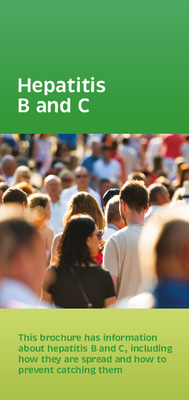Hepatitis B and C - HE4182

This brochure has information about hepatitis B and C, including how they are spread and how to prevent catching them.
The full resource:
What are hepatitis B and C?
Hepatitis B and C are diseases caused by the hepatitis B and C viruses.
Hepatitis B and C stop the liver from working properly. Both hepatitis B and C begin as acute infections (short-term illness that occurs soon after exposure to the virus), but in some people, the virus remains in the body, resulting in chronic disease (long-term illness) and long-term liver problems. Some people with chronic disease develop liver cancer, while others might need a liver transplant.
In New Zealand, about 100,000 people are living with hepatitis B and about 50,000 are living with hepatitis C.
How do you get hepatitis B or C?
You can get hepatitis B or C by coming into contact with the blood or body fluids of someone who has hepatitis B or C.
This can be through:
- sharing toothbrushes, razors, towels, facecloths
- sharing needles or syringes used for skin piercing, tattooing or injecting
- having contact with blood or body fluids
- having sexual contact without condoms (this is rare for hepatitis C)
- having contact with cuts or scratches (this is rare for hepatitis C).
Symptoms
A person can have hepatitis with no symptoms at all. Even if a person has no symptoms, they can still spread the virus to others.
Hepatitis B and C have similar symptoms. They include:
- fever
- feeling very tired
- sore joints
- not wanting to eat
- feeling sick or vomiting
- stomach pain
- jaundice (yellow skin and eyes)
- dark urine (pee)
- pale, grey coloured faeces (poo).
A blood test will show if a person has hepatitis B or C.
Talk to your doctor or nurse if you think you have hepatitis B or C, or if you have been in close contact with someone who has hepatitis B or C.
Chronic hepatitis B and C
Most people with hepatitis B clear the virus from their bodies as they get better. But some don’t clear the virus – these people have chronic hepatitis B. Some people with chronic hepatitis B stay well for a long time and then get very sick many years later. People with chronic hepatitis B can spread the virus to others even if they do not look or feel sick.
Many people with chronic hepatitis C have no symptoms and don’t know they have the disease. However, because the virus is in their bodies, they can spread it to other people. Chronic hepatitis C is a long-term illness that can lead to serious liver problems, including scarring of the liver (cirrhosis) or liver cancer.
Treatment
There are treatments available for both hepatitis B and C. Your doctor will discuss these with you, including the benefits and risks. You may also need to have regular blood tests to check your liver and the amount of virus in your body.
Hepatitis B and C are notifiable diseases – meaning that your doctor will inform the local Medical Officer of Health in your local Public Health Service (PHS). The PHS may contact you to find out how you were infected.
Living with hepatitis B or C
Taking care of yourself
It’s important to take care of yourself if you have hepatitis B or C. Hepatitis stops the liver from working properly – and there are things you can do to reduce the amount of work your liver has to do:
- cut back on alcohol
- avoid drugs
- avoid fatty foods.
You can also look after yourself by:
- eating a balanced diet
- being smokefree
- exercising regularly.
Talk to your doctor or nurse for advice.
Telling others
You do not have to tell others if you have hepatitis B or C, but you do need to do everything you can to prevent spreading the disease to others – see below for more information. Letting your sexual and household contacts know that you the disease means they can get tested to see if they have caught it. They can also be vaccinated against hepatitis B.
Preventing hepatitis B or C
There are vaccines available to prevent hepatitis B. The vaccines are free for babies and children under 18 years, and some adults. Talk with your doctor or nurse to find out more.
There is no vaccine against hepatitis C.
To prevent spreading or catching hepatitis B or C:
- Always use condoms during sex.
- Cover cuts and scratches.
- Do not share toothbrushes, razors or other personal items.
- Do not share needles, syringes or other injecting equipment, including those used for skin piercing and tattooing.
- Be careful about blood contact, for example, when playing a contact sport.
- Get advice from your doctor if you are likely to have contact with blood or body fluids at work.
- Do not donate blood if you have hepatitis B or C.
More information
- Talk to your doctor or nurse.
- Visit the Health New Zealand | Te Whatu Ora website: Hepatitis B (info.health.nz) or Hepatitis C (info.health.nz)
- Visit the Hepatitis Foundation of New Zealand website: Hepatitis | The Hepatitis Foundation of New Zealand or call free on 0800 33 20 10